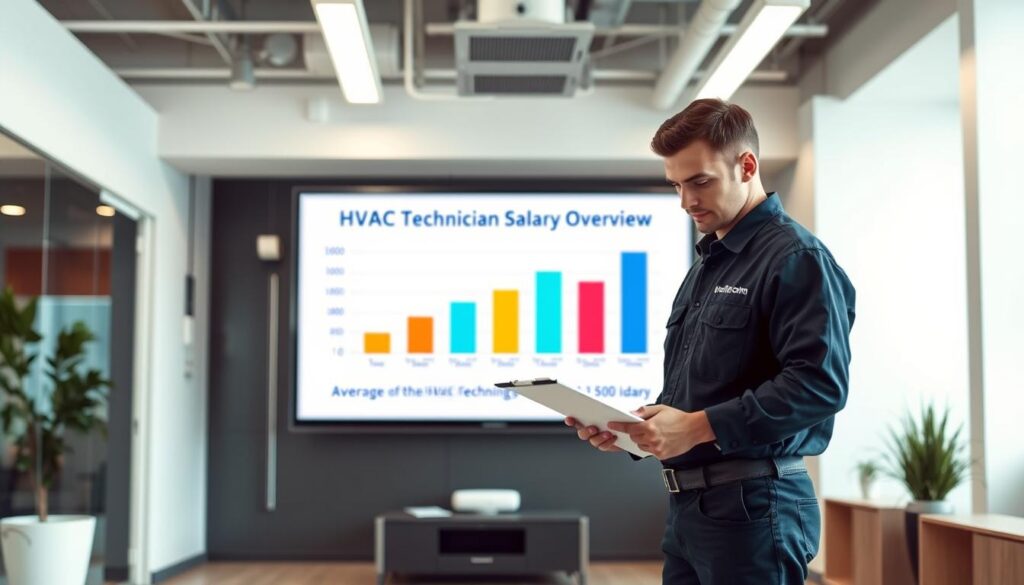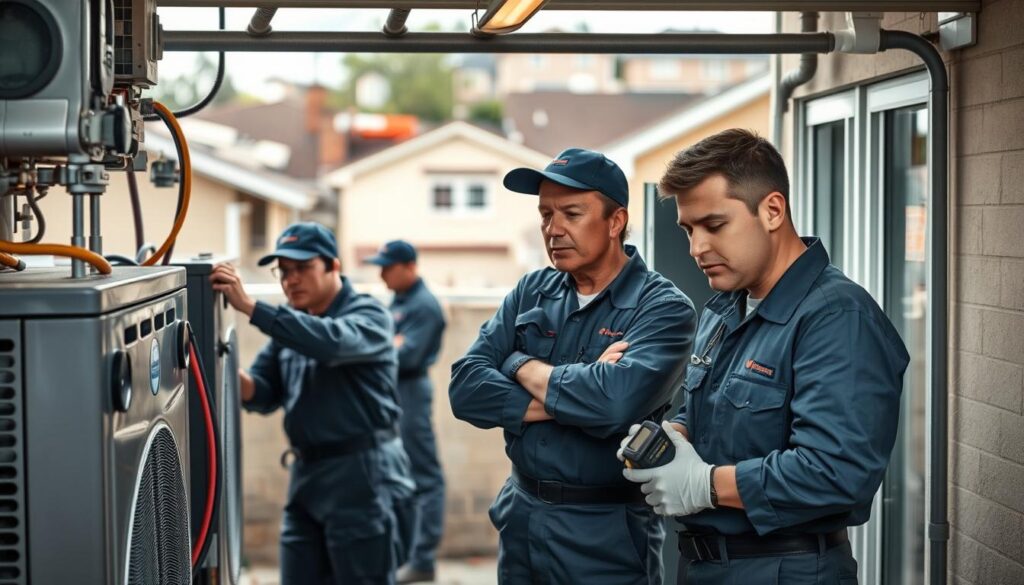Affiliate Disclosure
HVAC Guide Guys is a participant in the Amazon Services LLC Associates Program, an affiliate advertising program designed to provide a means for sites to earn advertising fees by advertising and linking to Amazon.
How Much Do HVAC Techs Make a Year? Ever thought about if an HVAC technician career could lead to financial stability? Learning how much HVAC techs make a year might surprise you. It could even change your career goals.

The HVAC technician salary scene is full of promising chances for those into skilled trades. On average, these professionals make about $29.00 an hour. Their yearly earnings can range from $46,000 to $68,000. Your earnings can change based on your experience, where you work, and your special skills.
Looking into how much HVAC techs make a year shows it’s more than just a job. It’s a stable and possibly very rewarding career path. The need for HVAC services keeps growing, giving you steady chances in different fields.
Key Takeaways
- Average hourly rate for HVAC technicians is $29.00
- Annual salaries range between $46,000 and $68,000
- Earnings depend on experience, location, and specialization
- Growing industry with consistent job opportunities
- Potential for career advancement and higher earnings
Table of Contents
Understanding HVAC Technician Salary Overview
Thinking about becoming an HVAC service technician? Knowing how much you can earn is key. The HVAC field offers good pay, but it depends on your experience, where you work, and your skills.
The job market for HVAC pros is strong. With the right skills, you can earn a lot and see your pay rise as you get better at your job.
National Average Earnings
Recent numbers show HVAC techs make about $50,590 a year on average. This is a good starting point for a career in heating, ventilation, and air conditioning.
| Income Percentile | Annual Earnings |
|---|---|
| Bottom 10% | $31,000 |
| Median | $50,590 |
| Top 10% | $80,000 |
Median Annual Income Breakdown
Your pay as an HVAC service technician can change for several reasons:
- Where you work
- What you specialize in
- Any certifications you have
- How long you’ve been working
Salary Range by Experience Level
As you get more experienced, your salary will likely go up. Beginners start with lower pay, but those with advanced skills can earn more.
“Your earning power in the HVAC field grows with your skills and experience.” – Industry Expert
Staying up-to-date with training and getting more certifications can really help your income grow over time.
Explore Our HVAC Shop
Looking for top-rated HVAC tools, parts, and accessories? Visit our shop and find the perfect solution for your needs.
Visit the ShopHow Much Do HVAC Techs Make a Year: State-by-State Analysis
Exploring how much HVAC pros make shows big differences by state. Your earnings can change a lot based on where you work, local economy, and demand for services.
It’s key for HVAC techs to know how salaries vary by state. Things like living costs, population, and local projects affect how much you can earn.
| State | Average Annual Salary | Ranking |
|---|---|---|
| Alaska | $75,660 | 1st |
| Massachusetts | $73,300 | 2nd |
| New Jersey | $70,500 | 3rd |
| California | $68,990 | 4th |
| District of Columbia | $67,550 | 5th |
Here are some important points about salary differences:
- Coastal and big city areas usually pay more
- Northern states often have better pay
- How complex HVAC needs are in your area can also affect your pay
Pro tip: Check out the local job market before choosing where to start your HVAC career. This can help you make more money.
Top-Paying States for HVAC Professionals
Exploring hvac trade income levels shows some states pay more than others. HVAC technicians in certain areas can earn more by knowing the best-paying places in the U.S.
Hvac job pay rates differ a lot between states. Some areas pay much more than others. These top-paying states offer great chances for skilled HVAC pros to earn competitive salaries.
Alaska: The Highest HVAC Earning
Alaska has the highest average salary for HVAC techs at $75,660 a year. The extreme weather and unique geography make it a high-demand place for HVAC skills.
- Average hourly rate: $38.21
- Unique environmental factors drive high compensation
- Challenging work conditions justify elevated pay scales
Massachusetts: A Close Second in HVAC Earnings
Massachusetts is second with an average salary of $73,300 a year. Its strong infrastructure, tech innovation, and dense population make it a great place for HVAC skills.
New Jersey: Competitive HVAC Compensation
New Jersey is third with an average salary of $70,500 a year. Its close location to big cities and diverse industries offer many chances for HVAC pros.
Skilled HVAC technicians can maximize their earning by choosing the right location and keeping their skills sharp.
While these states have the highest salaries, remember to look at more than just pay. Consider living costs, job stability, and career growth too.
Explore Our HVAC Shop
Looking for top-rated HVAC tools, parts, and accessories? Visit our shop and find the perfect solution for your needs.
Visit the ShopStates with Moderate HVAC Salaries

Several states offer good chances for HVAC technicians. Texas, Minnesota, and Connecticut have salaries that are not too high or too low. They provide stable jobs for HVAC workers.
These places are great for HVAC pros looking for steady pay. Salaries here usually fall between $61,250 and $62,955. This range is good for growing your career.
- Texas: Known for diverse industrial sectors and consistent demand
- Minnesota: Strong infrastructure and seasonal HVAC requirements
- Connecticut: Robust commercial and residential markets
Your salary in these states depends on a few things:
- Local economic conditions
- Industry demand
- Specific metropolitan area opportunities
- Individual skill level and certifications
Even though salaries are moderate, these states offer great chances for career growth. You can improve your skills in the HVAC field here.
Experience Levels and Corresponding Pay Scales
Understanding how HVAC technician salary progresses with experience is key to planning your career. The HVAC industry offers great financial growth as you improve your skills and knowledge.
Your earning power in the HVAC field grows as you gain more experience and specialized knowledge. Here’s a look at salary expectations at different career stages:
Entry-Level Positions (0-2 years)
At the start of your HVAC career, your salary is around $52,300 a year. Your earnings at this stage depend on several things:
- Basic technical training
- Initial certification completion
- Geographical location
- Employer type
Mid-Career Development (2-4 years)
With more experience, your HVAC technician salary can rise to about $63,500 a year. This phase involves:
- Developing advanced troubleshooting skills
- Gaining hands-on complex system experience
- Expanding technical knowledge
Senior Level Earnings (4-7 years)
Experienced HVAC pros can earn around $74,500 a year. Your skills become more valuable as you master complex installations and repairs.
“Continuous learning is the key to maximizing your HVAC career.” – HVAC Industry Experts
Keep in mind, these figures are national averages. Your actual earnings might vary based on specialization, certifications, and local market demands.
Explore Our HVAC Shop
Looking for top-rated HVAC tools, parts, and accessories? Visit our shop and find the perfect solution for your needs.
Visit the ShopCommercial vs Residential HVAC Income Differences

Exploring HVAC careers means understanding income differences between commercial and residential work. Your income as an HVAC installer can change a lot based on your specialization.
Commercial HVAC service technician wages are usually higher than residential ones. This is because of several important reasons:
- Complexity of industrial systems
- Scale of projects
- Advanced technical requirements
- Higher skill level needed
The pay reflects the technical challenges of each setting. Commercial HVAC technicians work on complex systems in big buildings, hospitals, and factories. They need advanced skills and high-tech tools.
| HVAC Sector | Average Annual Income | Skill Level Required |
|---|---|---|
| Residential HVAC | $52,000 – $65,000 | Intermediate |
| Commercial HVAC | $65,000 – $85,000 | Advanced |
Choosing between residential and commercial HVAC can shape your career. Residential jobs offer steady hours, but commercial work pays more and offers special training.
Impact of Certifications on HVAC Salaries
Professional certifications can really boost your earnings as an HVAC pro. Getting specialized training and credentials can make you stand out. This can lead to better pay and more job chances.
Getting certified shows you’re an expert in HVAC. It proves your skills and dedication. This can mean higher pay and more job offers.
EPA 608 Certification Benefits
The EPA 608 Certification is key for HVAC techs working with refrigeration. It lets you legally work with refrigerant equipment. Plus, it can make you more attractive to employers.
- Increase your marketability to employers
- Potentially earn 10-15% more than non-certified technicians
- Legally handle refrigerant equipment
NATE Certification Advantages
NATE certification is the top choice for HVAC pros. It can lead to:
- Higher starting salaries
- Faster career advancement
- Greater respect from employers and clients
HVAC Excellence Certification Impact
HVAC Excellence certification shows off your technical skills. It can boost your earnings by proving your advanced knowledge.
By getting these certifications, you can improve your career. You’ll open up new chances in the HVAC field.
Career Growth and Salary Progression
Your journey in the HVAC trade can lead to exciting career paths with substantial income growth. HVAC job pay rates show a lot of promise for those who keep learning and make smart career moves.
Advancing in the HVAC industry involves several strategies:
- Specializing in advanced system technologies
- Pursuing leadership and management roles
- Developing expertise in emerging green technologies
- Starting an independent HVAC business
HVAC trade income levels usually go up with experience and specialized skills. Those who keep learning can see big salary jumps.
| Career Stage | Potential Annual Income | Key Skill Requirements |
|---|---|---|
| Entry Level | $35,000 – $45,000 | Basic technical knowledge |
| Supervisory Role | $65,000 – $87,700 | Leadership and advanced technical skills |
| Business Owner | $90,000 – $150,000 | Business management and technical expertise |
Certifications and specialized training can speed up your career growth and increase your earnings in the HVAC field.
Smart technicians focus on new areas like smart home systems, renewable energy, and advanced climate control. These areas offer better pay and more career chances.
Explore Our HVAC Shop
Looking for top-rated HVAC tools, parts, and accessories? Visit our shop and find the perfect solution for your needs.
Visit the ShopProjected Job Growth and Future Earnings
The HVAC industry is on the verge of big growth, promising stable and well-paying jobs. As technology improves and saving energy becomes more important, the pay for HVAC jobs keeps going up.
The Bureau of Labor Statistics says HVAC technician jobs will grow a lot by 2033. They expect the industry to add about 40,100 new jobs. This is a 5% increase from before.
Industry Growth Dynamics
Several important factors are pushing the HVAC industry to grow fast:
- More people want energy-saving cooling and heating systems.
- Old HVAC units need to be replaced.
- There’s a big push for green building technologies.
- More homes and businesses are being built.
Salary Trends and Projections
Your earnings in this field look good. Technicians can see their salaries go up over time. Skills and certifications are key to how much you can earn.
Regional Growth Opportunities
Where you live will affect your job chances. Places with fast growth and new buildings will have the best opportunities for HVAC workers.
“The future of HVAC is not just about maintaining temperature, but creating sustainable, efficient environments.” – Industry Expert
Conclusion
Exploring how much HVAC techs make a year shows a promising career path. The HVAC technician salary offers great growth, skill development, and financial stability. Your earnings depend on experience, location, certifications, and specialization.
Planning your career can greatly affect your income. By constantly learning, getting specialized certifications, and choosing in-demand areas, you can boost your salary. The HVAC industry is expected to grow, providing strong job opportunities and good pay for skilled workers.
The HVAC industry offers a dynamic career, whether you start at the bottom or aim for top roles. Your dedication to learning and keeping up with new tech is essential. With hard work and strategic skill building, you can have a rewarding and profitable HVAC career.
Your success in HVAC isn’t just about the money. It’s also about the joy of providing vital services and solving tough technical problems. Your growth in this field is only limited by your passion and desire to improve.

